高三英语二轮复习课件代词
高考英语二轮复习人称代词物主代词反身代词课件20张
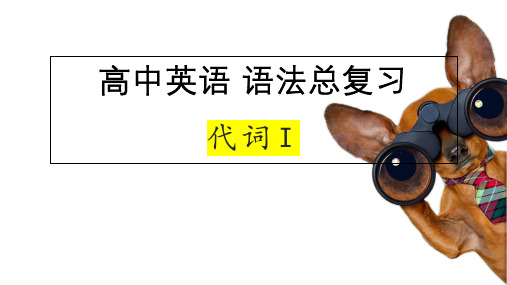
You,he and I are from China.
你、我和他都来自中国。
We,you and they like the same book.
A.feel; it
B.feels; it
C.feels; them
(3)形物代、名物代练习
4.My best friend and ________ were fixing up the broken machine when the rainstorm came.
A.I
B.me
C.mine
5.Mike’s aunt is ________ English teacher. We all like ________.
我们、你们和他们喜欢同一本书。
人称代词练习
1.Even if we are in Grade 9, it’s necessary for _______ to go to bed early and get up early.
A.we
B.us
C.our
2.These are my cousins. ________ are both university students.
C.me; one
D.me, it
(1)反身代词的分类
3.反身代词 (2)反身代词的用法
(3)反身代词固定搭配
(1)反身代词的分类
人称 数
单数
复数
第一人称
myself ourselves
第二人称
yourself yourselves
【图文】高考英语二轮复习语法系统讲解课件:代词
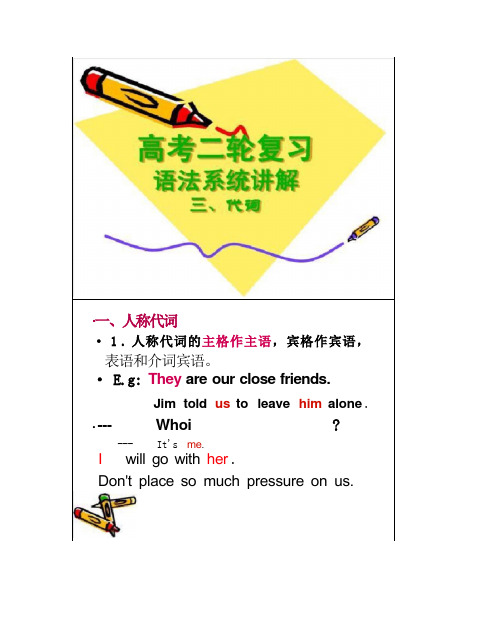
·一、人称代词·1.人称代词的主格作主语,宾格作宾语,表语和介词宾语。
·E.g:They are our close friends.Jim told us to leave him alone. ·---Whoi?--- It's me.·I will go with her .·D on't place so much pressure on us.2.在than引起的从句中,如不跟其他词常可用人称代词的宾格,如跟其他词,则须用人称代词的主格eg:He is more intelligent thanher/she (is).Lucy works harder than me/I(do).3.在电话用语中常用主格。
eg:---I wish to speak to Mary.---This is she.4. 在简短对话中,当人称代词单独使用或者在not 后多用宾格。
eg:---Have more wine?--- Not me.---Ilike English.---Me too.5.在介词but,except 后,有时可用主格也可用宾格。
eg: Nobody knows him except I/me,二、 物主代词1. 形容词性的物主代词只作定语,也就是 一定要+名词.my our your his her theirEg:Their parents are workers.2. 名词性的物主代词可作主语、宾语、表语和与of 连用作定语。
mine ours yours his herstheirsIt is not our classroom. Ours is on the second floor. edidn't bring her pen, so I gavemine.· 1. A c l assroom is on the sec 2. Please return B books in time. · (A. they, B. their, C.theirs) .3.This is not △ book is on Your; C. you; Yours·4.Our room is overB· (A. your B yours C.you)will come to seeofriend ofo me mV minefloor.(A.Our,B. We, C.Ours) the desk. A. your, Yours B.yours,·3.在汉语中,“我的”,“你的”这种同有时可以省掉,英语中物主代词普通不省掉。
高三英语二轮复习课件1-3代词
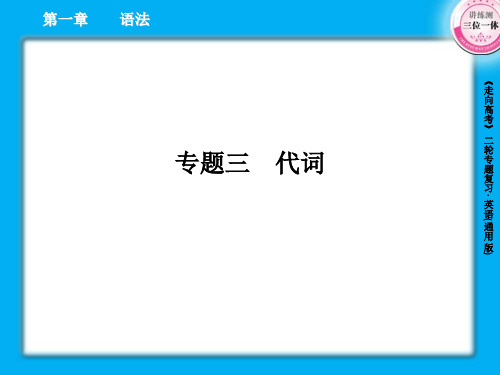
第一章
语法
四、all, none, both, either, neither的用法区别
1.all表示三者或三者以上的人或事物或表示抽象意 义的“一切”。 All of the boys went swimming yesterday. All goes well.
《 走 向 高 考 》 二 轮 专 题 复 习 · 英 语 通 用 版
《 走 向 高 考 》 二 轮 专 题 复 习 · ( ) 英 语 通 用 版
第一章
语法
典例
(2011·潍坊抽测,30)I just choose a simpler
《 走 向 高 考 》 二 轮 专 题 复 习 · 英 语 通 用 版
lifestyle, ________ where I can ride my bike all over and do not have to make a great living to survive. A.that C.one B.it D.another
《 走 向 高 考 》 二 轮 专 题 复 习 · ( ) 英 语 通 用 版
第一章
语法
◆点拨
解题时,要善于抓住题干中的关键词汇: ①表示数量的词(有时候借助语法手段来表示,如题干 中用的最高级,表明数量是大于或等于三); ②能够显示肯定或否定意义的词。
《 走 向 高 考 》 二 轮 专 题 复 习 · ( ) 英 语 通 用 版
《 走 向 高 考 》 二 轮 专 题 复 习 · 英 语 通 用 版
是指前面的my dictionary)
I have lost my dictionary; I think I must buy one.(one 在该句中表示泛指,因为my dictionary已经丢了,不可能 再买它了)
【高考】英语二轮复习代词ppt课件
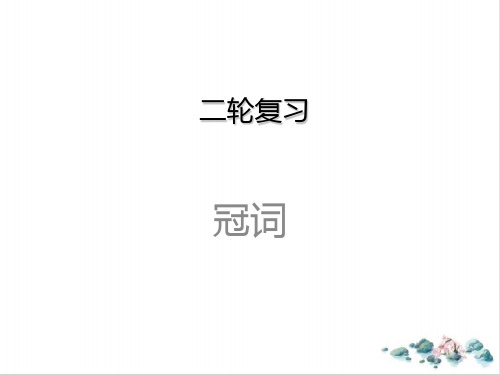
播?(播放视频)
-Who invented ____ computer? , break the silence, in the South of China, for the most part(整体上,多半), the Chinese/Japanese/French language, the first one, the largest
Summer in ___ south of France are for ____ most part dry.
A. /; a B. the; / C. /;/ D. the; the
表示方位的名词前加定冠词the。但在a town east of Chongqing等结构中方位名词前不 用冠词。
二轮复习
冠词
-Hello, co不uld定I冠sp词ea的k t特o M殊r考. S查mi要th?点
-Sorry, wrong number. There isn’t ____ Mr. Smith here.
不定冠词放在姓名前=a certain,意为“某一 (个)”。
John had made up his mind to give it up, but on ___ second thought he determined to try ____ third time.
completely changed ___ man’s understanding 28、青春总是多了伤感,凉了心脏,痛了过去。
9、人犯错误,多半是在该用真情时太过动脑筋,而在该用脑筋时又太感情用事。
of
color. 2、慈母的心灵早在怀孕的时候就同婴儿交织在一起了。——狄更斯
64、本来无望的事,大胆尝试,往往能成功。——莎士比亚
高考英语二轮复习语法系统讲解ppt课件代词

• 2.名词性的物主代词可作主语、宾语、表 语和与of连用作定语。
• mine ours yours his hers theirs
• It is not our classroom. Ours is on the second floor.
• She didn’t bring her pen, so I gave her mine.
工地内堆放材料的地面及行车路段全 部硬底 化,工 地大门 口设立 洗车槽 。保证 车辆出 入方便 安全, 也有利 于文明 施工。 基础土 方开挖 时,安 排专人 轮班在 工地出 入口冲 洗土方 运输车 辆的轮 胎,避 免运输 车辆轮 胎的淤 泥污染 校院路 面。
三、反身代词
• myself ourselves yourself yourselves
工地内堆放材料的地面及行车路段全 部硬底 化,工 地大门 口设立 洗车槽 。保证 车辆出 入方便 安全, 也有利 于文明 施工。 基础土 方开挖 时,安 排专人 轮班在 工地出 入口冲 洗土方 运输车 辆的轮 胎,避 免运输 车辆轮 胎的淤 泥污染 校院路 面。
• 1. _A______classroom is on the second
高考二轮复习
语法系统讲解
三、代词
工地内堆放材料的地面及行车路段全 部硬底 化,工 地大门 口设立 洗车槽 。保证 车辆出 入方便 安全, 也有利 于文明 施工。 基础土 方开挖 时,安 排专人 轮班在 工地出 入口冲 洗土方 运输车 辆的轮 胎,避 免运输 车辆轮 胎的淤 泥污染 校院路 面。
• 一、人称代词 • 1.人称代词的主格作主语,宾格作宾语、
• 4.在简短对话中,当人称代词单独使用或 在not 后多用宾格。
2024届高考英语二轮复习语法:代词课件(共38张PPT)
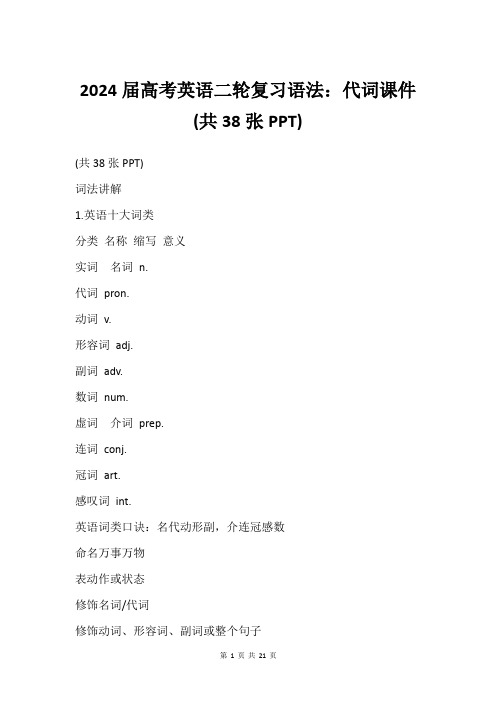
2024届高考英语二轮复习语法:代词课件(共38张PPT)(共38张PPT)词法讲解1.英语十大词类分类名称缩写意义实词名词n.代词pron.动词v.形容词adj.副词adv.数词num.虚词介词prep.连词conj.冠词art.感叹词int.英语词类口诀:名代动形副,介连冠感数命名万事万物表动作或状态修饰名词/代词修饰动词、形容词、副词或整个句子表数量/顺序表位置、时间、关系等表并列、递进、转折等表泛指/特指表语气代名词实词可以单独作句子成分,有词形变化;虚词不可以单独作句子成分,没有变形三、代词代词是代替名词或名词短语以及相当于名词或名词短语的词或句子的词。
一、人称代词人称代词不仅指人也可指物,有人称、数和格的变化,其分类如下表所示:人称代词有主格和宾格之分,主格形式在句中作主语、表语、同位语等成分,宾格形式在句中作宾语、同位语等,有时也作表语。
单数复数主格宾格主格宾格第一人称IMeWeUs第二人称YouYouYouYou第三人称He,she,itHim,her,itTheythem1、we、you、they、he表示泛指的用法We、you、they 可以泛指人们,意为“我们”“你们”“他们”,单数用he。
We all get into trouble sometimes.我们每个人偶尔都会遇到麻烦。
You should finish the work this afternoon.你今天下午应该完成工作。
They say that honesty is the best policy.人们说诚实是上策。
He who laughs last laughs best.谁笑到最后谁笑得最好。
2、he、she的用法He指代男性,she 指代男性。
在一些特殊情况中,he和she可以用来指代事物或动物。
指代宠爱的动物、通人性的动物往往用he、she;不带情感色彩时用itGo and find the dog and put him out.去把狗找到,放他出去。
2023新教材高考英语二轮专题复习:语法填空-介词冠词和代词课件

7.[2022·江苏省连云港市模拟二]In ________ 1920s and 1930s, he collected around 400,000 seeds from five continents.
第一步:确定填冠词 分析句子成分可知,空处有名词festival。 第二步:判断特指还是泛指 此处指上文提到过的“the first International Tea Day”,故用表示特指的定冠词。
解题攻略 *第一步:确定是否填冠词 首先,分析句子结构,看空格后是否有名词。 *第二步:判断特指还是泛指 ①若空格后有单数可数名词,搭配后表示泛指时,应考虑不定冠词 a/an; ②若发现空格后有名词,搭配后表示特指时,应考虑定冠词the; ③看看是否是固定搭配典例。
答案与解析:an 考查冠词。句意:所以赏菊也成为了节日里一个必不可少的 活动。activity是可数名词的单数形式,且表泛指, essential是元音音素开头, 故填an。
4.[2022·汕头市三模]The 49yearold singer and composer has surprisingly become ________ online hit for livestreaming fitness routines from his home.
答案与解析:it 考查代词。句意:虽然很多人称这个地区为南大洋,但一些 科学家称其为南冰洋,另一些科学家称其为南极海。空处指代上文的“this region” 作宾语,需用代词it。
2.[2022·唐山市一模]It will take some time to popularize the new travel trend and the prices must remain competitive to ensure that regular tourists can afford ________.
高三英语二轮专题复习名师课件:1-2代词

第一篇 专题二
走向高考 ·二轮专题复习 ·新课标版 ·英语
答案:D
本题考查考生对代词及部分否定的掌握情况。
题干的意思是:“这是一个二选一的情况 ——我们要么今年 买一辆新车要么去度假,但是我们不能二者兼得。”分析题 意可知, 这是在两者之间进行选择, 所以排除 A、 C 两项, either 用在否定句中表示全部否定,而 both 用在否定句中表示部分 否定,所以选 D。
第一篇 专题二
走向高考 ·二轮专题复习 ·新课标版 ·英语
典例 (2013· 全国Ⅱ,14)It's an eitheror situation—we can buy a new car this year or we can go on holiday but we can't do ______. A.others C.another B.either D.both
走向高考· 英语
新课标版 ·二轮专题复习
路漫漫其修远兮 吾将上下而求索
走向高考 ·二轮专题复习 ·新课标 ·英语
第一篇
知识运用篇
第一篇
知识运用篇
走向高考 ·二轮专题复习 ·新课标版 ·英语
第一篇
专题二 代词
第一篇
知识运用篇
走向高考 ·二轮专题复习 ·新课标版 ·英语
考向指导
3
易错盘点
热点例析
第一篇 专题二
走向高考 ·二轮专题复习 ·新课标版 ·英语
考点三:复合不定代词的用法 由 some,any,no,every 加上body,one,thing 构成 的不定代词,叫复合不定代词。 1. some 构成的不定代词一般用于肯定句, 意为“某人或 某物,重要的人或事”。如: Somebody is waiting outside. I have something for you. She thinks she's something since she won the prize. 获奖之后,她觉得自己了不起了。
高考英语二轮复习课件代词、连词PPT课件

it作形式宾语的常用句型(S代替主语,V代替谓语) (1)S+V+it+adj./n.+to do sth. We consider it a great honor to be able to host the 2008 Olympic Games. (2)S+V+it+adj./n.+doing sth. They find it no use searching the empty house. Do you consider it any good trying again? (3)主语+谓语+it+that/when... I don't like it when you shout at me.
(1)It was John himself that put him in trouble.
(2)You can believe me. I saw it myself.
(3)My bag is bigger than yours.
2.one,ones,the one,that,those可以代替前面出现的名词,
(2)I'm planning to buy a house.I'd like one with a garden.
(3)The population in Guangzhou is bigger than that in Changsha.
(4)I prefer the apples in the basket to those in the box.
(4)It seems/appears/happens that... It seemed that he had known the truth. It so happened that I was standing at the gate when the guests arrived. (5)It matters/doesn't matter that... It matters a lot whether he will agree to our plan. (6)It is no use/no good/no harm doing sth. It's no good arguing with him.
高考英语二轮复习专题代词和介词课件 (共47张PPT)
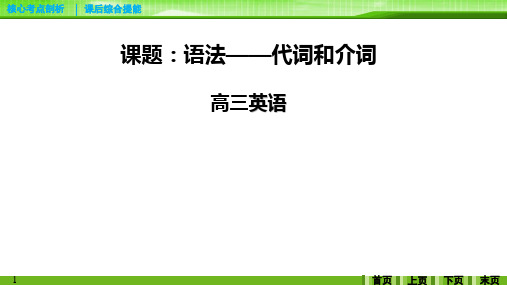
stay at home.
语法重点
3. Last year, my brother and I went to Miami for a vacation. Some of my friends who had been there before said __________was a wonderful holiday destination.(2014·广东)
物主代词
behav反e 身on代es词elf seat oneself
think for oneself
形容词性物主代词只 co反me身to代o词ne在sel句f…中…可以作
能在名词前作定语, 名词性物主代词相当 于“形容词性物主代 词+名词”,在句中
enjoy、teach 、hurt 等动 词和by、 for 、to等介词 的宾语,还可以作主语 或宾语的同位语。
appreciate 等)+it+that/if/when ...
语法重点
2.It 的用法
5.用于强调句型“It is/was+被强调部分+that/who ...” John's success has nothing to do with good luck. It is years of hard work that has made him what he is today. 约翰的成功和好运气没关系。是多年的努力工作才使他有了今天。
高考英语语法复习代词教学课件

2. 反身代词可以作主语的同位语,主要起加 强语气的作用,意为“亲自,本人,亲 身”。
e.g. The teacher and pupils mended the road themselves.
3. 反身代词可以在be, feel, look, seem等系动 词后作表语,表示身体或精神状态处于正 常。
everything
no one / nobody nothing
高考英语语法复习代词课件
高考英语语法复习代词课件
b. some, any, both, none, either, neither, all, one, each, many, much, another, other, more, most, few, little等。
高考英语语法复习代词课件
高考英语语法复习代词课件
一、指示代词 指示代词是用来指代或标记人或事物的代词,
表示“这个(些)”、“那个(些)”。 1. 指上文提到的事物,一般用that,有时也用
this;指下文将要提到的事物,常用this或 these。如: He said I was lying, and that was unfair. (that指代上文He said I was lying) What I want you to remember is this: Practise makes perfect. (此句中this指代下文,不能换为that)
高考英语语法复习代词课件
高考英语语法复习代词课件
四、不定代词 1)不定代词可分为两类: a. 由body, one, thing构成的复合不定代词
某
任何
每个, e / somebody
something
2025届高三英语二轮复习:定语从句基本用法(关系代词)课件(共24张ppt,内镶嵌音频)

5.(2019 课标全国Ⅲ,64)They were well trained by their
masters__w__h_o__/t_h_a_t__had great experience with caring
__th__a_t_/w__h_i_c_h___aim to describe how digital systems
influence society and help readers understand the nature of digital systems and their many interacting parts.
whose 通常指_人___,也可指_物___,在定语从句中 作定语,表示所属关系,不可省略。
1. 关系代词的选择
as
常见的固定表达: 1. As we all know:__众__所__周__知________ 2. As is well known:_众__所__周__知____________ 3. As we expect:正__如__我__们__预__料__的__那__样 4. As is often the case:_像__常__规__那__样_____ 5. As we can all see:_正__如__我__们__都__能__看__到__的__那__样__
3. The girl who you saw in the street is Mary.
4.This is the factory which the students visited
代词专题课件高三英语二轮复习

强调句型:It is/was...that...
倒装句型:So/Such...that...
虚拟语气句型:If I were you, I would...
比较句型:The more...the more...
代词的易错点和难点解析
05
代词的指代错误
代词与所指代的名词不一致
代词与上下文语境不符
代词专题课件高三英语二轮复习
汇报人:
目录
Contents
01
添加目录项标题
02
代词的分类和用法
03
代词在句中的作用和位置
05
代词的易错点和难点解析
04
代词的特殊用法和固定搭配
06
高考真题解析和实战演练
添加章节标题
01
代词的分类和用法
02
人称代词
主格:I, you, he, she, it, we, they
主语+代词+形容词:I am happy, You are smart, He is tall, She is beautiful, It is interesting, We are excited, You are talented, They are friendly
主语+be动词+代词:I am, You are, He is, She is, It is, We are, You are, They are
用法:用于强调或表示某人或某物与自身相关的动作或状态
示例:I hurt myself while playing football.
指示代词
定义:用来指示人、事物或抽象概念的代词
常见指示代词:this, that, these, those, such, so
高考英语 二轮复习 专题3 代词 知识点归纳练习 精品PPT课件

2.人称代词的格 (1)在无动词分句中,人称代词通常用其宾格。例如: —Who can name two pronouns? —Who? Me? —I'm going to spend the weekend in the countryside. —Me,too.
(2)人称代词做表语时多用宾格。例如: This is him,a般取 决于被强调的部分在从句中所充当的句法作用。例如: It was I that(who)carried the boy to safety.(“我”在从句中 作主语,故用主格人称代词I。) (3)在比较状语从句中,人称代词的格取决于话语的深层结构。 试比较: He helped me more often than she(did). He helped me more often than(he did)her.
—Is there going to be a film tonight? —I think so.(=I think there is going to be a film tonight.) 如果要对前句的内容进行否定,则可采用下面两种结构:
(1)don't+believe/think/expect/suppose+so,例如: —He will fail in the entrance exam. —No,I don't believe so. (=I don't believe he will fail in the entrance exam.) (2)believe,think,expect,suppose,hope,hear,be afraid +not。例如: —Do you think it's going to rain over the weekend? —I believe not. —I wonder if he met with the accident. —I think not and I hope not.
高三英语(人教)总复习语法专题课件:代词(共50张PPT)

代词AI ......................................................... ・皿=俸爲互动探究.........=. . (V)弋☆核心突破•导与练☆none, no one, neither, no thing 和no 的用法■ 1. none “没人,没有任何东西”,既可指人,也可指物。
none后可接of短语,常用来回答how many/much的问题。
■[考题印证](2012 •课标全国卷)Lany asks Bill and Peter to go on a picnic with him, but of them wants to, because they have work to do.■A. either B・ any■C. neither D. none■[解析]either和neitheT用于两者,any和none 用于三者以上/根据Bill and Peter可知血排除B s D两项;句中but表示转折z所以应选否定意义的C项,此处表示“但是他们(两人)没有想去的”。
■ 2 . no one表“没有人,谁也不”,只指人,作主语时,后跟单数动词。
常可用来回答who引导的问句。
-3. nothing意为“没有东西”,一般回答whato■[考题£卩证]—Can I have some milk for my coffee?■—I'm afraid there is _________ left.■A. nothing B. no one■C. none D. neither■解析]none表示“没有”,既可以扌旨人,也可以指物,但此处指的是物,强调的是数量O■[答案]c4. neither指“两个人或物中一个也不,两者都不”,表否定意义,作主语时谓语动词用单数。
not a (an)+可数名词单数5. no= [不可数名词“o"ny+可数名词复数X. 、I have no car.(no=not a)我没有车。
- 1、下载文档前请自行甄别文档内容的完整性,平台不提供额外的编辑、内容补充、找答案等附加服务。
- 2、"仅部分预览"的文档,不可在线预览部分如存在完整性等问题,可反馈申请退款(可完整预览的文档不适用该条件!)。
- 3、如文档侵犯您的权益,请联系客服反馈,我们会尽快为您处理(人工客服工作时间:9:00-18:30)。
3).that 和 those 用于表比较的结构。
The weather of Beijing is just as good as that of Tianjin.
• 7. each 可以与other构成固定的搭配,即each other意思 为“彼此、相互、互相”的意思,而every则不能。
one, another, the other 1. one 常用来作代词,替代前文所出现的同类可数名词,表示人或 物,以避免重复。例如: I haven't got a ball pen. I'll have to buy one. (= a ball pen) 我没圆珠 笔,我得去买一支。 He is one to think more of others. 他是个能多为别人着想的人。 2. the other, another 都可解释为 “另一个”。other 加上定冠词用于两 者中的另一个,another 指三者以上中的另一个。例如: He was two brothers. One is a doctor, the other is a teacher. We've received two parcels, one from my uncle, the other from my aunt. I don't like this one, show me another, please. I've just bought three things. One is a walkman, another is a pocket calculator, the third is a video game.
代词
I. 代词的分类
• 人称代词 I , you ,she ,him • 疑问代词 who whom what • 物主代词 my 、your、hers • 关系代词 which 、that、who • 反身代词 myself、yourselves • 连接代词 who、which、what • 相互代词 each other、one another • 不定代词 one、each、another、neither • 指示代词 this、that、those、these
(一) both, either, neither (二) one, another, the other (三) little, a little, few, a few (四) some / any, no / none, each / every,
many / much
不定代词 both either
1) Both Zhang Hua's father and mother worker work in a hospital, but neither one is a doctor.
2) 2) You may take either apple.
作宾语: 1) I like both of the toys very much. 2) 2) The boy could find neither of them and went away. 3) both 还可作同位语,它们句中的位置是在动词be,助动词或情
• 6. every two days, every second day都作“每隔一天”解, 但在实际应用中人们都用every other day来表示这一意 思,every two days也有人讲,而every second day则少用 的。也可以说every few days, 相当于汉语的“隔些日 子”。
II. 人称代词的用法
• 1) 作主语,用主格。作宾语用宾格。She teaches us English.
• 2)在句中作表语,常用宾格。Who is it? It’s me. 但有时用主格。 If I were she, I would’t go there. It was I who told him about it.
了自己),of oneself(自己的) ,between oneselves (秘密地), in oneself(本来, 本身) ,by oneself (单独地,独立地) • 3)作同位语,起强调作用。 You yourself told me the story.
IV. 指示代词的用法
• 1).时空的差别 eg. There is this seat here,near me,or there is that one in the fourth row. Which will you have,this or that?
1) Both (of them) enjoyed the rice. 2) Neither (of us) is a doctor. 3) Either (of you) will go.
注意:作主语时,both后面的谓语动词用复数。neither, either后 面的谓语动词一般用单数形式。 作定语:
1) Both Zhang and Wang are good students. 2) Either you or he is right. 3) Neither he nor i am a scientist.
• 1.There is a tree on _______ side of the street.
• 3. each通常用来指若干固定数目中的每一个,而every往 往指“任何一个”如:Each girl sitting over there is my student. “坐在那里的每一女孩子”指若干固定数目中的 每一个,故用each。Every man must do his best. “人人都 尽最大的努力”泛指任何一个人,因而用every。
态动词的后面,但在实义动词前面。 1) They are both in good health. 2) They will both go there. 3) They both agreed to take part in the birthday party.
此外,either 可作副词用于否定句,表示 “也”,相当于肯定句 中的 “too”。 This is not mine. That is not, either.
TV sets made in Nanjing are better than those made here. 4). 打电话时this 表示我,that表示你.
一些重要的 不定代词的用法
不定代词有both, either, neither, one,
the other, another, little, few, some, any, each, every, no, none等,从实际应用和理 解出发,重点学习以下几个:
• 不能说every of these dictionaries.
• 2. each可指两个或两个以上中间的每一个,而every只可 指三个或三个以上中间的每一个,不能指两个中每一个。 如: 可以说each of my eyes, 不可说every one of my eye 但可说every one of my toes(脚趾) 。
3. another 还有 “再……” 的意思,例如: Have another cup of coffee, please. ! She could have to stay here for another week. 4. other 有 “另外” 的含义。例如: Where are the other students? The boy is much cleverer than the other two. 5. others 和 the others 表示复数的泛指和特指。例如: In the park some are playing games. Others are walking near the river. I have five colour pencils. One is red, another is blue and the others are green. 6. the rest 也可作 “其余的” 解释。它用作主语时注意谓语动词的单 复数。例如:
• A. every
B. all C. either
D. both
• 2.There is a desk on _______ side of the room.
• A. both
B. either C. all
D. every
• 3.There is a desk on _______ sides of the room.
• 5.It is said that _______ of his parents have gone to Beijing.
• A. all
B. every C. both
D. either
every和each用法上的区别
• 1. each可作代词和形容词,而every只能用作形容词, each of these dictionaries或each one of these dictionaries,every one of these dictionaries
neither all
none
含义
两者都 两者中的任何
一个
两者都不
三者或三者以 上都
三者或三者以 上都不
数量 关系 =2 =2 =2 ≥3
≥3
作定语时 名词的数
复数
单数
单数 单数或复
数
○
作主语时 动词的数
